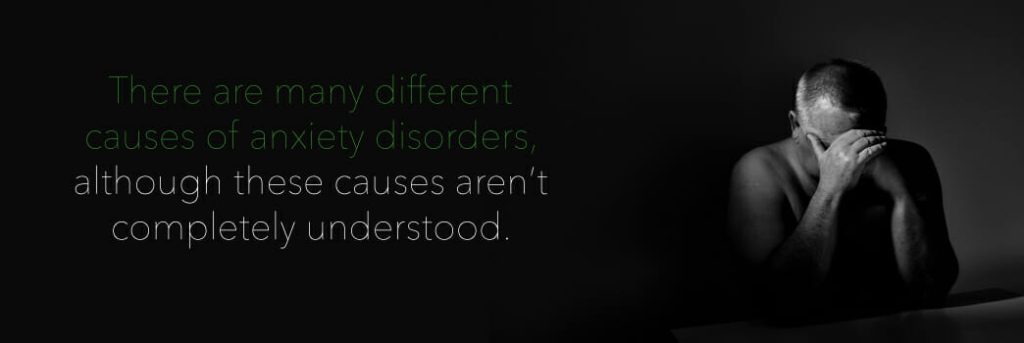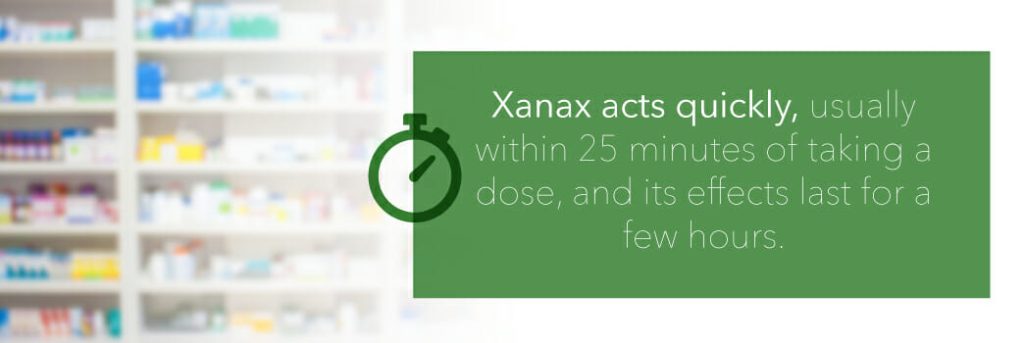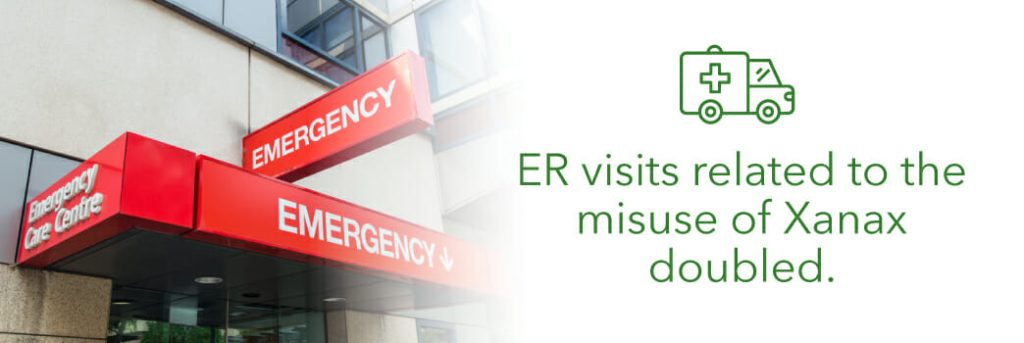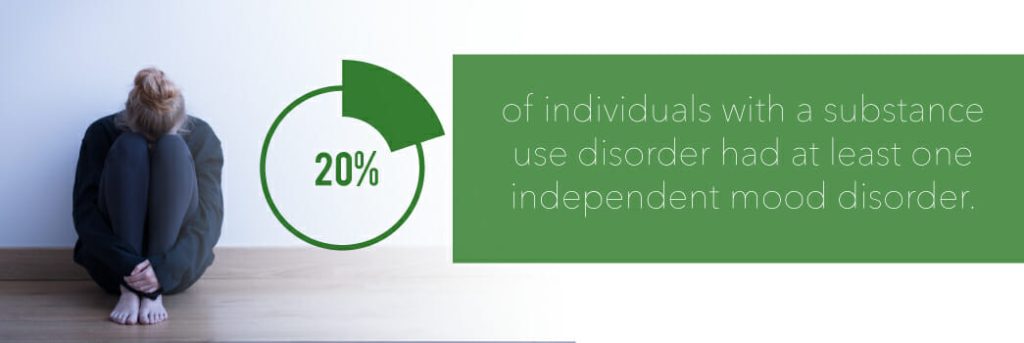Though it is a highly addictive drug, Xanax is easy to get hold of, as doctors routinely prescribe it, and it’s also readily available on the streets. Worryingly, addiction to the drug often given to you by a medical professional if you’re suffering from anxiety or a panic disorder has become increasingly widespread over the past few years.
Some people who abuse Xanax begin taking it for completely genuine reasons, whereas others might have initially come across it via friends or at a party. Xanax abuse has become more prevalent in younger people in recent years, however, not everyone who tries Xanax becomes addicted. In spite of this, if you’re using it regularly, you run the real and very frightening risk of becoming physically dependent.
UNDERSTANDING ANXIETY
It’s perfectly normal to experience anxiety from time to time. It’s an accepted part of life. For example, when you’re facing a challenging situation, like a blind date, a tough exam, or a job interview, it’s unusual to feel entirely calm. The same goes if you’re a parent whose teen is just learning how to drive or is going away to college. If you’re a spouse going through marriage difficulties such as a separation or divorce, that too can lead to anxiety.
In moderation, anxiety is sometimes a good thing. It allows you to remain focused and alert. It can also motivate you to tackle your problems and take action when needed.
You have a problem with anxiety, though, when it interferes with your daily life, and your fears get to the point of overwhelming you. This is when you’ve progressed from productive normal anxiety into the world of anxiety disorders.
The Anxiety and Depression Association of America states that although anxiety disorders are the most common mental illness in America, as few as one third of sufferers ever seek treatment.
CAUSES AND RISK FACTORS OF ANXIETY

There are many different causes of anxiety disorders, although these causes aren’t completely understood.
LIFE EXPERIENCES
Traumatic events and negative life experiences can trigger these illnesses if you’re already anxiety prone. Sometimes inherited traits also contribute to your likelihood of developing an anxiety disorder.
MEDICAL CAUSES OF ANXIETY
For certain people, anxiety may stem from an underlying health or mental condition. In fact, in some cases, symptoms and signs of anxiety are the first indications of a medical illness. Some medical problems linked with anxiety are:
- Diabetes
- Heart disease
- Respiratory disorders
- Thyroid issues
- Drug withdrawal or abuse
- Alcohol withdrawal
- Anti-anxiety medication withdrawal
- Some rare tumors that produce anxiety-causing hormones
- Irritable bowel syndrome
- Chronic pain
- Depression
Anxiety can also sometimes be a byproduct of some medications, including:
- Asthma medications
- Blood pressure (hypertension) control medication
- Decongestants
- Oral contraceptives
- Thyroid medications
- Steroids
- Medications that contain caffeine
It’s more likely that the cause of your anxiety is an underlying medical condition if:
- You didn’t suffer from anxiety as a child.
- You don’t have any close blood relatives with an anxiety disorder.
- You experience a sudden episode of anxiety that seems to be unrelated to negative life events, and you don’t have a previous history of anxiety.
RISK FACTORS FOR ANXIETY
Some known factors that increase your risk of developing an anxiety disorder include:
- Having a stressed or anxiety-prone personality.
- Experiencing a buildup of stress that’s difficult to cope with. For example, from a financial strain, divorce or a death in the family.
- Being seriously ill or having a chronic, ongoing medical condition.
- Being traumatized either in childhood or adult life.
- Suffering from another mental disorder, such as depression.
- Having a close blood relative with an anxiety disorder.
- Using, abusing or withdrawing from alcohol or drugs.
If you can identify with any of the above, and have begun to feel anxious, continue reading to see if you suffer from some of the classic symptoms of an anxiety disorder.
ANXIETY DISORDER SYMPTOMS
There are various upsetting symptoms and signs of anxiety disorders, which may be chronic, physical, emotional or a combination of these.
CHRONIC ANXIETY DISORDER SYMPTOMS
If you identify with many of the following chronic symptoms, and signs, you may have an anxiety disorder:
- Do you feel that danger is lurking everywhere?
- Do you experience unexpected and sudden attacks of panic?
- Do you tend to avoid certain everyday activities or situations due to anxiety?
- Do you do things in a certain way, believing that something bad could happen otherwise?
- Do you feel haunted by irrational fears that you just can’t shake?
- Are you usually on edge, tense, and worried?
- Does your anxiety interfere with your everyday responsibilities?
If the above sounds like you, it’s important to get help as soon as you can.

EMOTIONAL SYMPTOMS
In addition to the standout symptoms of excessive irrational worry and fear, other very common symptoms include:
- Feeling that your mind’s gone blank
- Feeling irritable, tense and jumpy
- Feelings of dread or apprehension, and expecting the worst
- Feelings of restlessness, and trouble concentrating
These symptoms can negatively impact your life, and consequently can be hard to deal with.
PHYSICAL SYMPTOMS
Far more than a simple feeling, anxiety affects your entire body, as it’s a product of your fight-or-flight response. The physical symptoms of the condition are wide-ranging, and due to this, it’s common for you, the sufferer, to perhaps suspect you’re suffering from a medical illness. You may even have made countless visits to your doctor suffering from “mystery” illnesses before the discovery of your anxiety.
Common physical symptoms of anxiety include:
- Sweating
- Pounding heart
- Dizziness
- Stomach upsets
- Flushing
- Headaches
- Frequent diarrhea or urination
- Insomnia or fatigue
- Muscle twitches, tremors and tension
- Shortness of breath
These physical symptoms can be very unpleasant, and if you’re beginning to notice a pattern of yours that corresponds with being in anxiety-inducing situations, it’s time to have a talk with a medical professional.
TYPES OF ANXIETY
There are various different types of anxiety disorders, each having their own specific symptom profile. They include:
GENERALIZED ANXIETY DISORDER (GAD)
If you suffer from constant fears and worries, and these are getting in the way of you living your life, or you have a constant irrational feeling that something bad is about to happen, you could have generalized anxiety disorder. This anxiety disorder isn’t necessarily related to one type of fear, such as the fear of public speaking, but rather is a general anxiety condition that involves many areas of your life.
When you have GAD, you’ll feel:
- Restless and on edge
- Easily fatigued
- Irritability
- Difficulty sleeping
- Muscular tension
- Difficulty controlling your worries
SOCIAL PHOBIA (SOCIAL ANXIETY DISORDER)
You could have social anxiety disorder, or social phobia, if you suffer from a debilitating and all-encompassing fear of being publicly humiliated, as well as others viewing you negatively. Often considered as extreme shyness, if your social phobia is severe it could mean that you avoid all social situations, and barely leave the house.
Symptoms include:
- Feeling nauseous around people
- Trembling, blushing or sweating around others
- Steering clear of busy places
- Worrying well in advance before attending a social event
- Worrying about how others judge you
- Feeling very self-conscious around others, and worrying that they’ll laugh at or reject you
- Feeling anxious around others, and having difficulties communicating with them
PANIC DISORDER

When you have a panic disorder, you experience unexpected and related panic attacks that compound your fear of suffering another episode in the future. Agoraphobia — the fear of being in places that in the event of you suffering a panic attack, help or escape would prove difficult — sometimes accompanies panic disorders.
If you’re also suffering from agoraphobia, it’s likely that you’ll avoid going to both public and confined spaces.
You may find your panic disorder symptoms include:
- Sweating
- Shaking, or trembling
- Palpitations
- Sensations of shortness of breath
- Nausea
- Feelings of choking
- Chest discomfort
- Dizziness
- Lightheadedness
- Feelings of unreality
- Numbness or tingling sensations
POST-TRAUMATIC STRESS DISORDER (PTSD)
Post-traumatic stress disorder is a type of very extreme anxiety disorder that often occurs as the result of a life-threatening or traumatic event.
Similar in idea to a panic attack that rarely stops, PTSD symptoms include:
- Withdrawing from others
- Hypervigilance
- Experiencing flashbacks
- Having nightmares
- Being easily startled
- Feeling emotionally numb
- Difficulty sleeping, and concentrating
- Being easily angered, and irritated
- Avoiding all situations that remind you of the traumatic event
OBSESSIVE-COMPULSIVE DISORDER (OCD)

Characterized by unwanted behaviors or thoughts that are virtually impossible to control or stop, if you suffer from OCD, you could be troubled by obsessions, such as constantly worrying that you’ve turned off the lights, locked the doors or similar. You may also find that you’ve uncontrollable compulsions, like washing your hands repeatedly until they’re raw.
Most people with the condition fall into one of the following categories:
- Hoarders who can’t throw anything away.
- Arrangers and counters who are obsessed with symmetry and order.
- Doubters who feel that if everything isn’t done perfectly, something bad will occur.
- Checkers who check things over and over again, for example, whether a door is locked.
- Washers who are afraid of contamination, and obsessively clean their homes or wash their hands.
OTHER TYPES OF ANXIETY DISORDERS
Other types of anxiety disorders you might suffer from can be irrational fears of specific things, objects, situations or activities that present little or no danger in reality. These phobias can be of anything from fear of flying to being afraid of snakes.
When you’re suffering from a severe phobia, you may feel you need to go to extreme lengths to avoid what you’re frightened of. This avoidance only compounds your specific fear, and does nothing to improve your phobia.
UNDERSTANDING XANAX
Now that we’ve explained what anxiety is, the symptoms and the various types of anxiety disorders you may experience, it’s important to know that Xanax is a commonly prescribed and highly addictive drug used for the management of stress and anxiety.
To understand what the drug is, what it does to your body, and how it can lead to addiction, it’s important to look in more detail.
WHAT IS XANAX?

Xanax is the brand name for the tranquilizer Alprazolam. Developed in the late ‘60s to treat anxiety, the drug is a benzodiazepine that is depressant in nature. Xanax acts quickly, usually within 25 minutes of taking a dose, and its effects last for a few hours.
Sometimes referred to by the street names, bars, blue footballs, and xany bars, Xanax works by binding itself to your brain’s gamma-aminobutyric acid (GABA) receptors, and gives you a feeling of calmness.
TYPES AND DOSES OF XANAX
Xanax had its initial release by Upjohn Laboratories in 1981, and was first approved for use to treat panic disorder. The drug is FDA-approved for the short-term treatment of mild to moderate anxiety. Xanax is usually taken as needed, whenever you feel that your anxiety is becoming severe.
The drug comes in tablet form, extended release tablets, and as orally disintegrating orange-flavored tablets, with dosages of between 0.25 to 2 mg.
DANGERS OF XANAX
As the drug is very physically and mentally addictive, even simply using it exactly as prescribed can be risky to your health. In fact, according to the U.S. Substance Abuse and Mental Health Administration, and reported by Science Daily, between 2005 and 2011, ER visits related to the misuse of Xanax doubled.

Over time, you develop a tolerance to Xanax. Consequently, it’ll be necessary for you to take increasingly higher levels of the drug to achieve the result you need.
There’s also the risk of craving the euphoria that you feel when you take Xanax. If you continue to use the drug, particularly at levels higher than the recommended dosage, you can then become physically dependent.
This is why it’s crucial to use this medication with caution, and if you’ve ever had substance addiction issues, you might want to discuss being prescribed an alternative anxiety medication with your doctor.
Of course, Xanax is a prescription-only medication. However, dealers often sell it on the black market. The drug is particularly dangerous, sometimes causing:
- Seizures
- Mania and hypomania in patients with depression
- Lowered blood pressure
- Decreased breathing rate, to the point of unconsciousness. This is especially likely in people who are drinking alcohol as well as taking the drug.
According to a U.S. Substance Abuse and Mental Health Services Administration (SAMHSA) report, there’s been a significant increase in the number of individuals in the U.S. rushed to the ER due to abusing Xanax. This abuse includes not only taking Xanax on its own, but also includes mixing Xanax with alcohol, prescription drugs and illicit drugs.
XANAX INTERACTIONS
Substances or drugs that can interact with Xanax include:
- Sleeping pills, benzodiazepines, or sedatives — can be fatal
- CNS depressants, or narcotics — can cause depression of your central nervous system
- Alcohol — can lower your blood pressure, and decrease your breathing rate until you become unconscious
- Marijuana or tobacco smoking — can add to the sedative effects of Xanax
SIGNS OF XANAX ADDICTION
If you’re worried about whether you may be addicted to the drug, there are some signs of Xanax addiction you can look out for. These include:
- Feelings of anger and agitation
- Experiencing mood swings
- Feeling “out of it” on a regular basis
- Sleepiness
- Losing of interest in your usual activities
- Suicidal thoughts
- Cravings
- Hostility
- Stealing the medication of others, forging prescriptions or doctor shopping
- Taking more than you’ve been prescribed
- Crushing pills to chew or snort so they’ll get into your system faster
- Neglecting responsibilities
If any of the above apply to you, it’s imperative that you be as honest with yourself as possible. If you feel you need help, it’s time to take the next step and seek it out as soon as you can.
XANAX ADDICTION SIDE EFFECTS
Even if you’re taking the drug as prescribed, if you feel that something just isn’t right, you need to speak with your doctor, or if you’re feeling unwell, you may need to visit the ER without delay.
Some typical side effects of Xanax addiction are:
- Seizures
- Tremors
- Decreased urine output
- Swelling in hands and feet
- Suicidal thoughts
- Memory loss
- Blurred vision, or visual disturbances
- Jaundice
- Rapid weight loss
- Heart palpitations
- Stomach issues, diarrhea, or constipation
Mixing Xanax with drugs compounds these effects, and the results can be very serious or even fatal. If you’re worried, get help.
HOW XANAX IS ABUSED
Commonly abused for its sedative effects, the drug is particularly addictive when taken recreationally, or in ways other than it’s intended to be. You can also develop an addiction to Xanax even if you’re taking it as directed by your doctor.
Often, if you’re abusing Xanax, you may take over the recommended amount, or will crush the tablets in order to snort or chew them, so you can get them into your system as quickly as possible.
WHY DO SO MANY PEOPLE MIX XANAX AND ALCOHOL?
A person may offer you Xanax at a party where you’re drinking alcohol, and as everyone else is doing it, you might feel that it’s fine to accept. Since both these drugs produce a calming effect and slow down your brain activity, you may feel that through using them both together, you can forget about your anxiety and worries.
The problem with taking alcohol and Xanax together is that you can become over-sedated, and can even lose your life as a consequence. According to Scientific American, the same liver enzymes are responsible for clearing both these substances from your body, therefore the drugs stay in your system for longer, as your body needs to work harder to detox. Sometimes, this combination of Xanax and alcohol mixing can be deadly.
LINK BETWEEN ANXIETY AND ADDICTION
As you might imagine, anxiety can lead to addiction, and vice versa. According to a study reprinted by the National Institute on Alcohol Abuse and Alcoholism, around 20 percent of individuals with a substance use disorder had at least one independent mood disorder, and 18 percent had at least one current anxiety disorder independent of their substance use.

Comparably, approximately 20 percent of people with at least one independent current mood disorder suffered from a comorbid substance use disorder.
So, you see, that there is a real and proven link between anxiety and addiction. In fact, chemicals present in drugs such as alcohol and Xanax can affect the regular functioning of the brain and cause symptoms of anxiety. These feelings can also last for many weeks after you stop taking the drug.
This is why the cycle is so very difficult to break. Self-medicating for the anxiety that results from substance abuse means that you need to keep on abusing substances to try to keep it in check.
TREATMENTS AND THERAPIES FOR ANXIETY AND XANAX ADDICTION
There are varied complicating factors to having concurring disorders such as anxiety and Xanax addiction. These include:
- Higher incidence of relapse
- More pronounced withdrawal symptoms
- Greater risk of other health issues
This is why getting the right diagnosis, and anxiety and Xanax addiction treatment, is imperative for your current and future health.
As anxiety disorders and substance abuse are very closely related, the first issue to address is whether addiction or anxiety is the underlying issue. Initial mental and physical health evaluations are performed to make a diagnosis, and to find the best route forward.
In theory, substance-induced anxiety disorder should be easily treatable by taking away the Xanax, so the anxiety disappears. Even so, you need to seek professional treatment in order to detox with the right care.
You also need cognitive behavioral therapy and psychotherapy to help you understand your dual diagnosis and how to avoid relapsing in the future. Talking therapies, as well as medications to treat your Xanax withdrawal and relapse, are crucial to your recovery. One-to-one therapy can be very beneficial under these circumstances, as it can help you to both recover from your Xanax use, as well as manage your anxiety.
Counseling sessions focus on learning to live in recovery, as well as handling your cravings. So, it’s imperative to find a non-judgmental program that focuses on discreet outpatient treatment for Xanax addiction, like what we offer here at Synergy. We provide you with a comfortable, professional, private and spa-like setting to lead you to a new, healthier life with as little impact on your day-to-day living and responsibilities as possible.
We’ve helped many people overcome their addiction to Xanax. Let us help you too. If you’re struggling with a Xanax addiction, give us a call at 661-878-9930 . We maintain the highest level of privacy and confidentially when you’re visiting Synergy Recovery Services for Xanax addiction treatment.



